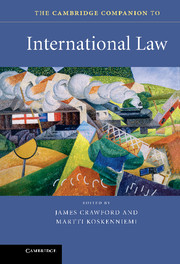Book contents
- Frontmatter
- Contents
- Preface
- Notes on contributors
- Introduction
- Part I The contexts of international law
- Part II International law and the state
- 4 Statehood
- 5 Sovereignty as a legal value
- 6 Exercise and limits of jurisdiction
- 7 Lawfare and warfare
- Part III Techniques and arenas
- Part IV Projects of international law
- Guide to electronic sources of international law
- International law chronology
- Select guide to further reading
- Index
- References
4 - Statehood
Territory, people, government
from Part II - International law and the state
Published online by Cambridge University Press: 05 July 2015
- Frontmatter
- Contents
- Preface
- Notes on contributors
- Introduction
- Part I The contexts of international law
- Part II International law and the state
- 4 Statehood
- 5 Sovereignty as a legal value
- 6 Exercise and limits of jurisdiction
- 7 Lawfare and warfare
- Part III Techniques and arenas
- Part IV Projects of international law
- Guide to electronic sources of international law
- International law chronology
- Select guide to further reading
- Index
- References
Summary
Introduction
Statehood has long been the central organising idea in the international system. Although there is no generally accepted legal definition of statehood, the best-known formulation is found in the 1933 Montevideo Convention on Rights and Duties of States: defined territory, permanent population, government and capacity to enter into relations with other states. Paradigmatically, territory, people and government coincide in the state to produce international law’s map of the world as a jigsaw puzzle of solid colour pieces fitting neatly together.
Although the state as territory–people–government is international law’s main device for representing the world, the intersection of this definition with other doctrines of international law complicates the picture. As this chapter shows, the result is a diversity of representational mandates: some states are made to carry one meaning, others another. From different conceptions of the state, the chapter moves next to different models of its centrality. The story it tells about international law scholarship proceeds from the state’s twofold significance as the international system’s main organising idea. First, on the analogy between states in international society and individuals in a society, states are like individuals. The accent on the state–individual analogy is basic to traditional international law, in which states are central in the sense that they are the only full legal subjects. But are states like individuals in a state of nature, as Thomas Hobbes famously thought, or are they like individuals in a state? Insofar as they tend toward the latter – or the domestic state even serves as the comparator for the international system – then ideas of the state fundamentally organise international law in a second sense. The international system is held up to the domestic state, whether in a concrete analogy or in some more abstract search for appropriate principles or a style of approach. And on this international system–domestic state comparison, the actors in the international system need not be limited to states.
- Type
- Chapter
- Information
- The Cambridge Companion to International Law , pp. 95 - 116Publisher: Cambridge University PressPrint publication year: 2012
References
- 9
- Cited by



